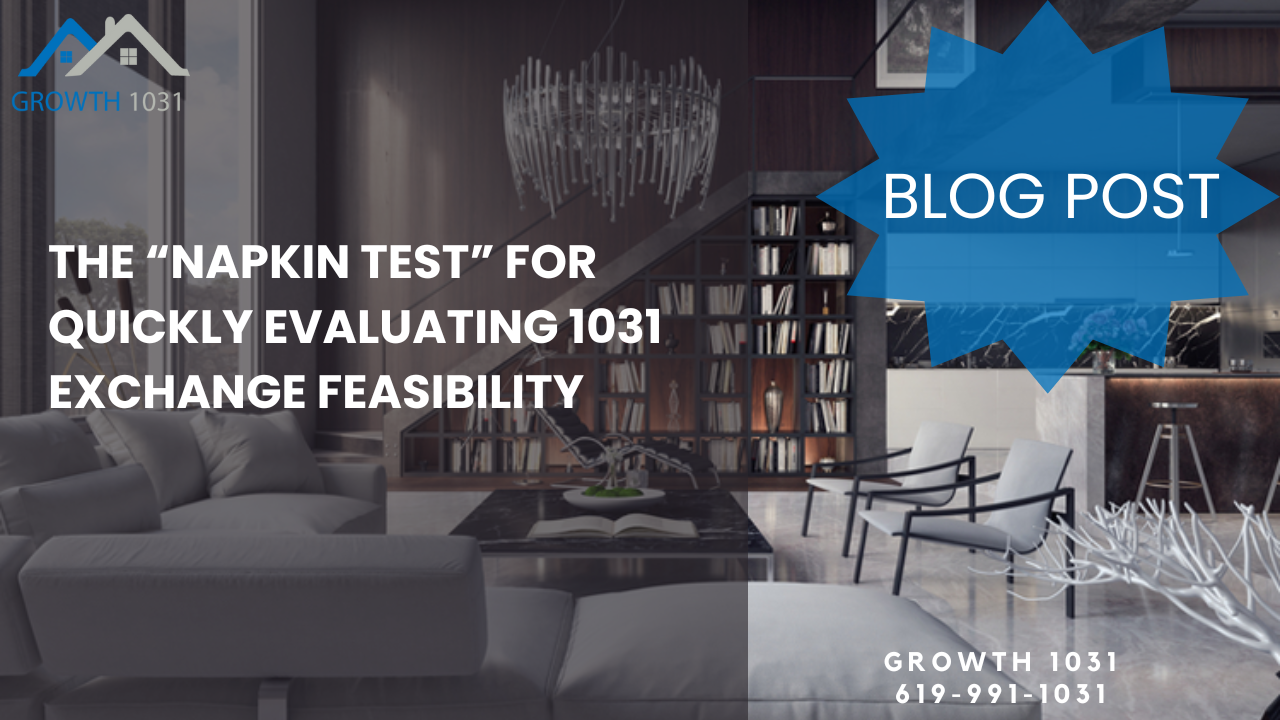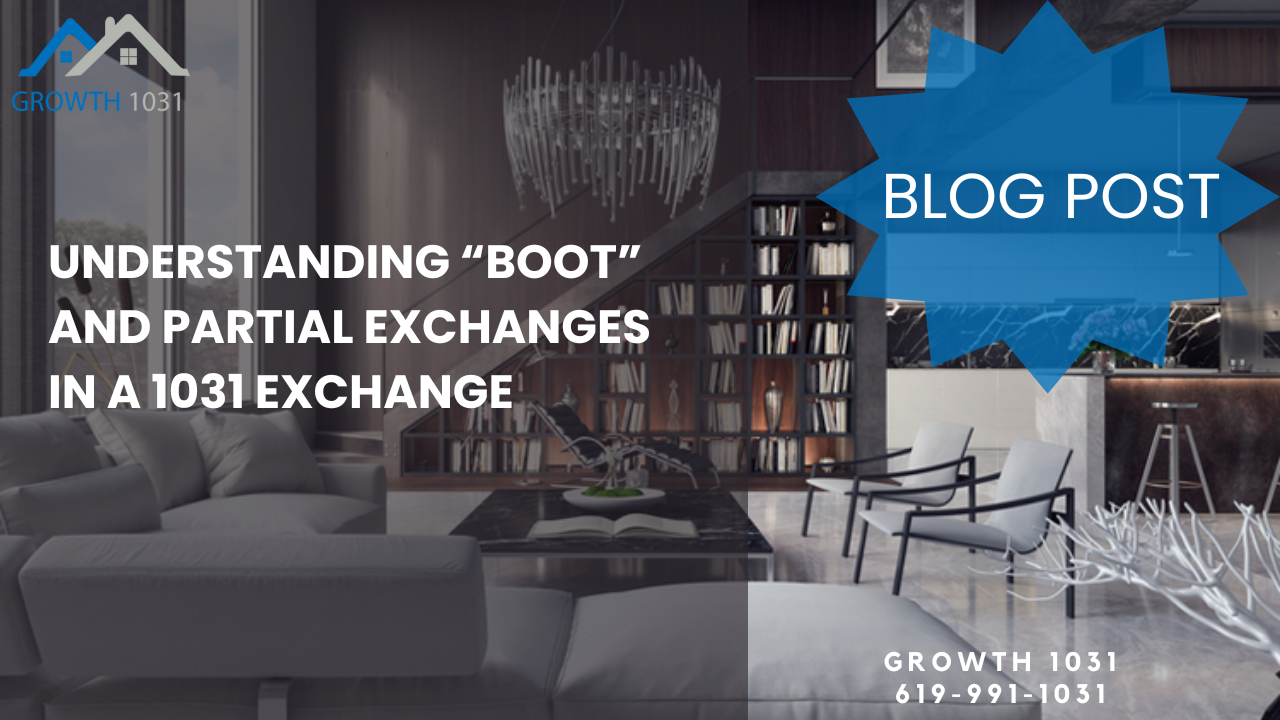Plan Ahead in 2026: Structured 1031 Exchanges Deliver Better Results
As we move deeper into 2026, the 1031 exchange continues to be a cornerstone strategy for real estate investors looking to defer capital gains taxes and reinvest equity more effectively. But in today’s market, successful exchanges don’t happen by accident — they happen with intentional planning, early action, and thoughtful strategy.Whether you’re thinking about selling this year or simply evaluating your long-term plan, now is the perfect time to revisit your approach to 1031 exchanges.
Why Early Planning Makes a Difference
Many investors wait until a property is under contract before thinking about a 1031 exchange — and that’s often when the pressure, risk, and missed opportunities arise.Here’s what proactive planning helps you achieve:
More Replacement Options
Identifying potential replacement properties before a sale gives you flexibility to choose assets that truly align with your goals.Better Financing Strategy
Understanding where your equity and debt stand early helps you structure the exchange to avoid taxable boot and maximize tax deferral.Strategic Positioning
A thoughtful approach lets you consider both active properties (hands-on management) and passive options (like DSTs), expanding your investment toolkit.
What Investors Should Focus On in 2026
• Understand IRS Requirements
1031 exchanges have strict timelines — a 45-day identification period and a 180-day closing window — and missing them can be costly.
• Align Structure with Goals
Are you aiming for higher cash flow? Less day-to-day management? Geographic diversification? Your strategy should reflect your broader objectives.
• Consult Early, Not Late
Working with experienced intermediaries, advisors, and tax professionals early gives you time to respond to market changes and refine your plan.
A 1031 exchange is more than a transaction — it’s a strategic financial move. When you plan ahead, evaluate options early, and structure with care, you’re better positioned to preserve more capital and achieve your investment goals in 2026 and beyond.
Starting 2026 Strong: Why Early 1031 Exchange Planning Matters
A new year brings fresh opportunities—and for real estate investors, 2026 is shaping up to be a strong year for strategic planning. Despite ongoing speculation in past years, the 1031 exchange remains fully intact and continues to be one of the most effective tools for preserving capital and growing long-term wealth.
At its core, a 1031 exchange allows investors to defer capital gains and depreciation recapture taxes when selling investment or business-use real estate. By reinvesting those proceeds, investors can keep more of their equity working instead of losing it to taxes. And with no limit on how many times an exchange can be used, it remains a powerful strategy for consolidation, diversification, or increasing cash flow.
What’s especially important at the start of the year is planning ahead. Even if a sale isn’t imminent, early conversations help investors understand timelines, replacement options, and market conditions—long before deadlines come into play. This proactive approach often leads to smoother transactions and better outcomes.
As we begin 2026, now is the right time to review your portfolio, consider future goals, and explore how a 1031 exchange might fit into your broader strategy. A well-structured plan today can help you move confidently through the year ahead.
Wishing you a successful and strategic start to 2026.
The “Napkin Test” for Quickly Evaluating 1031 Exchange Feasibility
A Simple Rule to Avoid Boot and Maximize Tax Deferral
Before diving into a 1031 exchange, investors often want a quick way to determine whether their numbers will work — without complicated spreadsheets or tax software. That’s where the “Napkin Test” comes in.Used widely by Qualified Intermediaries and real estate professionals, the Napkin Test is a simple way to see whether your exchange will fully defer capital gains taxes or whether you might accidentally create boot, which becomes taxable.
Here’s how it works.
What the Napkin Test Measures
A 1031 exchange aims to defer taxes by reinvesting all proceeds into a replacement property.To fully defer taxes, you generally must:
Reinvest all net equity
AND
Replace equal or greater debt than you had on the relinquished property.
If either of these two conditions isn’t met, you may trigger boot — which reduces your tax deferral.
The Napkin Test Formula
To avoid taxable boot:
Buy equal or greater value than the property you sold.
Roll over all equity from the sale into the new property.
Match or increase your loan amount (or bring cash to closing to offset debt reduction).
If all three conditions are met, your exchange typically passes the Napkin Test.
Example:
You sell a property for $1,000,000 with:
$400,000 in equity$
600,000 in debt
To fully defer taxes, your replacement property should:
Cost at least $1,000,000
Use all $400,000 of your equity
Include $600,000 or more in financing (or equivalent cash contribution)
If you reinvest less equity — or take on less debt without replacing it — the IRS considers the difference taxable boot.
Why the Napkin Test Matters
It’s a quick reality check that helps investors:
Avoid surprise tax bills
Understand whether boot is likely
Adjust financing before closing
Plan strategically for partial exchanges
While the Napkin Test doesn’t replace professional tax advice, it’s an essential first step in evaluating feasibility.
The Napkin Test gives you a fast, simple way to determine whether your exchange is on track for full tax deferral. If you can match or exceed value, equity, and debt — you’re likely in good shape.
Thinking about a 1031 exchange? We can help you run the numbers and structure your exchange for maximum tax savings.
How 1031 Exchanges Interact with Opportunity Zones
Can Investors Use Both Strategies Together?
1031 exchanges and Opportunity Zones are two of the most powerful tax tools available to real estate investors — but they operate under very different IRS rules. Many investors assume they must choose one or the other, but in certain situations, these strategies can work together.
Here’s what you need to know.
What a 1031 Exchange Does
A 1031 exchange allows investors to defer capital gains taxes by reinvesting sale proceeds into like-kind real estate.Key benefits include:Full tax deferralAbility to reinvest 100% of equityPortfolio growth through leverageBut it requires:Strict 45-day identification180-day closingReinvestment into real property
What an Opportunity Zone Offers
Opportunity Zones (OZs) provide tax incentives for investing capital gains into designated communities.Benefits include:Deferral of capital gains until 2026Partial reduction of the deferred gain (if held long enough)No tax on the new investment’s appreciation if held 10+ yearsBut:OZ funds require investment through a Qualified Opportunity Fund (QOF)The asset must meet substantial improvement or original use rules
How the Two Strategies Can Work Together
Here’s the part most investors don’t know:
You can 1031 into a property located inside an Opportunity Zone.
This does not give OZ tax benefits — but you still receive 1031 deferral.
You cannot place 1031 proceeds directly into a QOF.
Why? Because QOFs must receive cash from a taxable sale, not proceeds from a 1031 exchange.However…
You can do a 1031 exchange now, and later sell the replacement property and invest that gain into a QOF.
This two-step strategy allows:Short-term deferral via 1031Long-term tax elimination via Opportunity Zone investmentIt’s not common — but when timed correctly, it can be powerful.
When the Strategies Conflict
A 1031 exchange cannot be used to reinvest directly into:A QOFA partnership interestA fund structure that doesn’t hold direct real estateThis is the biggest misconception among investors.Additionally, Opportunity Zone rules require:Substantial improvementCompliance reportingInvestment through a QOF structureThese do not align with 1031 requirements.
While you can’t directly place 1031 funds into an Opportunity Zone Fund, investors can use both strategies in sequence — or invest in Opportunity Zone real estate directly through a traditional 1031 exchange.
Thinking about using both tax strategies? We can help you analyze whether a 1031 exchange, an Opportunity Zone investment, or a combined approach is the best fit for your goals.
1031 Exchanges & Leasehold Interests: The 30-Year Rule Explained
Most investors assume that only owned real estate qualifies for a 1031 exchange. But under IRS rules, certain long-term leasehold interests can also qualify as like-kind property — giving investors more flexibility than they realize.
Here’s what you need to know about how the 30-Year Rule allows leasehold interests to be used in a 1031 exchange.
What Is a Leasehold Interest?
A leasehold interest is a long-term right to use or control real estate without owning the land itself. Common examples include:
Ground leases
Commercial leases with long terms
Long-term development leases
Leaseholds can be exchanged for fee simple ownership (full ownership) if they meet IRS requirements.
The IRS 30-Year Rule
For a leasehold interest to qualify as “like-kind” real estate in a 1031 exchange, the IRS generally requires:
The lease must have 30 years or more remaining
This includes:
The initial lease term, plus
Any renewal options that are part of the contract
If the combined total is 30 years or longer, the IRS considers the leasehold interest equivalent to real property ownership.
Example:
A 12-year lease + three 6-year renewal options = 30 years → Qualifies
A 20-year lease + one 5-year renewal option = 25 years → Does NOT qualify
Why Leasehold Interests Matter in 1031 Exchanges
Leaseholds offer strategic advantages investors often overlook:
Access to high-value locations
Ground leases in premium markets (e.g., NYC, San Francisco) may cost far less upfront than purchasing land outright.
Development opportunities
Investors can build on leased land and still complete a 1031 exchange.
Flexibility in exchange structures
Leasehold interests can be used to satisfy tight identification or replacement deadlines.
When Leasehold Exchanges Become Risky
A leasehold interest will fail to qualify if:
The remaining term is under 30 years
Renewal options are not contractually guaranteed
The lease prohibits assignment or transfer
The structure appears designed solely for tax avoidance
The IRS scrutinizes artificially extended leases, so professional guidance is essential.
Leasehold interests can be powerful tools in a 1031 exchange — offering flexibility, access to premium locations, and lower acquisition costs. But they must meet the IRS 30-Year Rule to qualify as like-kind property.
Thinking about using a leasehold interest in your exchange?
Work with an experienced Qualified Intermediary to ensure your structure meets IRS requirements — and preserves your tax benefits.
The IRS “Related Party” Rules: The Hidden Danger Behind Many Failed 1031 Exchanges
When most investors think about 1031 exchanges, they focus on deadlines, property types, and reinvesting their proceeds correctly. But one IRS rule quietly invalidates more exchanges than people realize: the Related Party Rule.If a 1031 exchange involves certain relatives, business entities, or partnerships — and the transaction isn’t structured properly — the IRS can retroactively disqualify the entire exchange. This can trigger tens or hundreds of thousands of dollars in unexpected taxes.Here’s what investors need to know.
What Does the IRS Consider a “Related Party”?
For tax purposes, the IRS has a very specific definition of who counts as related. It includes:
Individuals
ParentsChildrenSiblingsGrandparentsGrandchildrenSpouses(Cousins are NOT considered related parties under IRS rules.)
Entities
A corporation where you own more than 50%A partnership where you own more than 50%Any entity you controlTrusts and estates in which you have significant ownershipThis means you can’t simply sell to your child or buy from your parents and expect full tax deferral — even though the properties may be perfectly like-kind.
Why Related-Party Exchanges Are Risky
The IRS is concerned that related parties may use an exchange to manipulate tax outcomes — such as shifting basis, avoiding recognition of gain, or cashing out tax-deferred proceeds.Because of this, the IRS imposes a strict rule:
Both parties must hold their new properties for at least TWO YEARS.
If either side sells or disposes of their property within 2 years, the IRS can collapse the exchange and retroactively tax the first transaction.This is known as the Two-Year Holding Rule.
Situations That Commonly Cause Exchanges to Fail
1. You sell a property to your brother and buy a replacement from an unrelated seller.
This fails because the IRS assumes the brother could sell soon after — breaking the two-year rule.
2. You buy a replacement property from your parents.
The transaction is automatically scrutinized, and the exchange may be denied altogether.
3. You sell to a related party who wants to cash out.
If they sell within two years, your entire exchange becomes taxable.
4. Indirect related-party sales through entities you control.
Forming an LLC doesn’t hide ownership from the IRS.
When Related-Party Exchanges Are Allowed
There are a few narrow situations where related-party exchanges can succeed:
Both parties want long-term ownership
If neither party sells their property for at least two years, the IRS generally accepts the exchange.
You exchange properties with a related party with no tax advantage gained
Example: two siblings swap properties of similar value and similar basis.
The related party is also doing a 1031 exchange
If both sides exchange into like-kind property, the intent is clearly tax-deferral, not cash-out.
Exceptions to the Two-Year Rule
The IRS allows exceptions only when:One party diesThere is involuntary conversion (e.g., eminent domain)Circumstances change for reasons not motivated by tax avoidanceThese exceptions are rare and heavily scrutinized.
Related-party 1031 exchanges are not impossible, but they are high risk and one of the most common ways an exchange gets denied by the IRS.If you’re considering a transaction involving family members, business partners, or an entity you control, it is crucial to:Work with a Qualified IntermediaryConsult a CPA or tax attorneyEnsure both parties intend to hold their new properties for at least two years
Thinking about a 1031 exchange involving a family member or related entity?
Let us help you structure it properly — and avoid costly IRS pitfalls.
Tax Implications When a 1031 Exchange Fails
A 1031 exchange allows real estate investors to defer capital gains taxes when swapping one investment property for another. But what happens when an exchange doesn’t go as planned — and fails to meet IRS requirements?
When a 1031 exchange fails, the sale is treated as a taxable event. That means the entire gain from the sale becomes immediately subject to capital gains tax — and potentially depreciation recapture — as if no exchange had been attempted.
Common Reasons for a Failed Exchange
Missed deadlines: Not identifying a replacement property within 45 days or not closing within 180 days.
Receiving cash (“boot”): Taking possession of sale proceeds before completing the exchange.
Improper property type: Acquiring property that doesn’t qualify as “like-kind.”
Using unqualified intermediaries: Working with an entity that doesn’t meet IRS safe harbor rules.
What You Can Do
If your exchange fails, your qualified intermediary will release your sale proceeds — but they’ll be taxable in the year of the sale. However, you may still offset part of the gain with deductions or losses from other investments.
To avoid this, plan ahead. Engage a qualified intermediary early, verify your replacement properties quickly, and always adhere to IRS timelines.
The Bottom Line
A failed 1031 exchange can lead to a hefty and unexpected tax bill. Proper preparation, professional guidance, and strict compliance with IRS rules are your best defense.
Thinking of selling an investment property? Learn how a 1031 exchange can help you preserve more of your profits — and reduce your tax exposure.
State-Level 1031 Exchange Rules and Differences
Understanding How States Like California and New York Handle Deferred Taxes
While the IRS governs 1031 exchanges at the federal level, not all states treat them the same way. If you’re exchanging property in states like California or New York, it’s important to know how each handles deferred taxes — especially when your exchange crosses state lines.
California
California allows 1031 exchanges, but with a key twist — it tracks deferred gains when your replacement property is located out of state.
This means if you sell a California property and buy one elsewhere, the California Franchise Tax Board (FTB) will keep a record of the deferred gain. When you eventually sell that out-of-state property, California expects its share of the taxes, even years later.
New York
New York also honors 1031 exchanges but is strict about reporting and documentation. Investors must disclose exchange details on state tax filings, including the properties involved and the deferred gain.
Unlike California, New York does not track deferred gains once the property leaves the state, but accurate reporting is essential to avoid state-level audit issues.
Other States
Most states align with federal 1031 rules, but some—like Pennsylvania and Massachusetts—do not recognize 1031 exchanges at all. In those states, deferred gains are still taxable at the state level, even if they’re deferred federally.
When planning a 1031 exchange that spans multiple states, always check local tax rules. A strategy that’s fully deferred under federal law may still trigger state-level taxes.
Consult with a tax professional or qualified intermediary experienced in multi-state exchanges to ensure full compliance — and maximum tax deferral.
Thinking of selling an investment property? Learn how a 1031 exchange can help you preserve more of your profits — and reduce your tax exposure.
How a 1031 Exchange Helps Build Long-Term Wealth
A 1031 exchange isn’t just a tax-saving tool — it’s one of the most effective strategies for growing long-term real estate wealth. By deferring capital gains taxes, investors can keep more of their money working for them — allowing for compounding growth, greater leverage, and smarter portfolio diversification.
Compounding Gains
When you defer taxes through a 1031 exchange, you’re essentially reinvesting what would have gone to the IRS. Over time, that reinvested capital can generate additional income and appreciation, accelerating your portfolio’s growth.
Leverage for Larger Investments
By rolling all proceeds into a new property, investors can use leverage to upgrade into higher-value assets — such as multifamily properties or commercial buildings — that produce stronger cash flow and long-term appreciation.
Portfolio Diversification
A 1031 exchange also provides flexibility to diversify. Investors can move from one property type or market to another — for example, from residential rentals to industrial or from one state to another — without triggering taxes.
A well-planned 1031 exchange allows you to grow wealth tax-deferred, maximize buying power, and adapt your portfolio to changing market opportunities — keeping your capital compounding instead of being reduced by taxes.
Thinking of selling an investment property? Learn how a 1031 exchange can help you preserve more of your profits — and reduce your tax exposure.
Capital Gains vs. Depreciation Recapture: What You Need to Know
When selling an investment property, most investors focus on capital gains taxes — the profit earned from the sale. However, there’s another tax that often catches investors off guard: depreciation recapture. Understanding both is essential when planning a 1031 exchange.
Capital Gains Tax
Capital gains are the profits made when you sell a property for more than your original purchase price. If you’ve held the property for more than a year, you’ll typically pay long-term capital gains tax, which ranges from 0% to 20%, depending on your income bracket.
Depreciation Recapture
Depreciation recapture is the IRS’s way of “clawing back” the tax benefits you received from depreciation deductions during ownership. When you sell, the IRS taxes this portion — up to 25% — even if the property has appreciated in value.
For example:
If you depreciated $200,000 over time, and you sell the property, you could owe up to $50,000 (25% of $200,000) in depreciation recapture tax.
How a 1031 Exchange Helps
A 1031 exchange allows you to defer both capital gains and depreciation recapture taxes — as long as you reinvest all proceeds into another like-kind property. By doing so, you keep your capital working for you instead of paying a large tax bill immediately.
While capital gains get most of the attention, depreciation recapture can significantly impact your net proceeds. A well-structured 1031 exchange can defer both, allowing your equity to continue growing tax-deferred.
Thinking of selling an investment property? Learn how a 1031 exchange can help you preserve more of your profits — and reduce your tax exposure.
Understanding “Boot” and Partial Exchanges in a 1031 Exchange
A 1031 exchange lets real estate investors defer capital gains taxes by reinvesting proceeds from a sale into another like-kind property. But what happens if you don’t reinvest all of the proceeds? That’s where the concept of “boot” comes in.
What Is “Boot”?
“Boot” refers to any cash or non-like-kind property you receive during a 1031 exchange. Essentially, it’s anything that isn’t reinvested into your new property — such as leftover cash, mortgage relief, or personal property included in the deal.
For example:
If you sell a property for $1,000,000 and only reinvest $900,000 into the new property, the $100,000 difference is considered boot — and it becomes taxable.
Tax Implications
Boot is taxed as capital gains, reducing the total amount of gain that can be deferred under Section 1031. The IRS treats it as if you received part of your profit in cash. Even if your overall exchange qualifies, you’ll still pay taxes on that portion.
Partial Exchanges
A “partial exchange” occurs when part of the proceeds is reinvested (tax-deferred) and part is received as boot (taxable). Many investors do this strategically — for instance, to access some liquidity while still deferring most of their gains.
The Bottom Line
To maximize tax deferral, reinvest all exchange proceeds and match or exceed your previous property’s debt. But if you need some cash flexibility, a partial exchange can still make sense — just understand that any boot received will trigger immediate tax liability.
Thinking of starting a 1031 exchange? Don’t wait until it’s too late—contact us today to ensure your transaction is set up for success.
Missed the 180-Day Rule? Here’s What Happens in a 1031 Exchange
The 1031 exchange is one of the most powerful tax-deferral strategies for real estate investors. However, it comes with strict IRS rules—especially the 180-day deadline. From the day you sell your relinquished property, you have 45 days to identify a replacement property and 180 days to close on the purchase.
But what happens if you fail to complete the purchase within that 180-day window?
1. Your Exchange Fails
If you don’t close within 180 days, your 1031 exchange is automatically disqualified. The IRS does not allow extensions (except in very rare disaster-related relief situations).
2. Capital Gains Taxes Become Due
Once the exchange fails, the sale of your relinquished property is treated as a regular taxable sale. This means:
You’ll owe capital gains tax on the profit.
If you’ve held the property for more than a year, long-term capital gains rates apply.
You may also owe depreciation recapture taxes, state income taxes, and possibly the Net Investment Income Tax.
3. You Lose Deferral Benefits
The main advantage of a 1031 exchange is the ability to roll all of your equity into a new investment, tax-deferred. Missing the deadline forces you to pay taxes now, reducing the amount of capital available for reinvestment.
4. Cash Is Returned to You
Any funds held by your Qualified Intermediary (QI) will be returned to you after the failed exchange. Once the 180 days are up, your QI is required to release the funds back, and those proceeds become taxable.
5. It May Impact Future Strategies
Paying taxes earlier than planned may affect your ability to grow your portfolio. A failed exchange could mean fewer funds to leverage into larger or more profitable properties.
The Bottom Line
Missing the 180-day deadline is one of the most common (and costly) mistakes in a 1031 exchange. The IRS does not grant exceptions, so careful planning is essential. Start working with a Qualified Intermediary and your real estate team early to make sure deadlines are met and your exchange stays on track.
Thinking of starting a 1031 exchange? Don’t wait until it’s too late—contact us today to ensure your transaction is set up for success.
What “Like-Kind” Really Means in a 1031 Exchange
One of the most common questions investors ask about a 1031 exchange is: “What qualifies as like-kind property?” The answer is often broader than many people expect.
What “Like-Kind” Really Means
In IRS terms, “like-kind” doesn’t mean the properties must be identical—it simply means they must be held for investment or business purposes. For example, you can exchange:
An apartment building for raw land
A rental home for a commercial property
Vacant land for a warehouse
What Doesn’t Qualify
Personal residences, fix-and-flip properties, or property primarily intended for resale do not qualify. The key factor is that the property must be for investment or productive use in a trade or business.
Why It Matters
Understanding the flexibility of “like-kind” allows investors to diversify their portfolios, move into stronger markets, and build long-term wealth—all while deferring capital gains taxes.
Thinking about exchanging into a new type of property? A 1031 exchange might open more doors than you realize. Contact us today to explore your options!
How to Stay on Track in Your 1031 Exchange
Timing Is Everything: Understanding the 45- and 180-Day Rules in a 1031 Exchange
A 1031 exchange can be a powerful tool for deferring capital gains taxes, but success depends heavily on meeting strict IRS deadlines. Two key rules every investor must understand are the 45-day identification rule and the 180-day closing rule.
The 45-Day Identification Rule
From the day you sell your relinquished property, you have 45 days to identify potential replacement properties in writing. Missing this window means your exchange will not qualify—so planning ahead is critical.
The 180-Day Closing Rule
In addition to identifying properties within 45 days, you must complete the purchase of one or more of those identified properties within 180 days of your sale. These timelines run simultaneously, which means you don’t get extra time after the 45-day period.
Why These Deadlines Matter
Failing to meet either deadline can disqualify the exchange and trigger capital gains taxes. That’s why working with a knowledgeable Qualified Intermediary (QI) is essential—they help you stay on track and avoid costly mistakes.
By staying mindful of the 45- and 180-day rules, you can maximize the benefits of your 1031 exchange and keep your wealth working for you.
Ready to start your 1031 exchange? Contact us today and let’s make your next move tax-smart!
Secure Your 1031 Success with the Right Qualified Intermediary
A 1031 exchange offers incredible tax benefits for real estate investors—but only if the process is handled correctly. One of the most important parts of a successful exchange is working with a Qualified Intermediary (QI). The QI plays a critical role, and choosing the right one can make or break your transaction.
Why a Qualified Intermediary Is Essential
The IRS requires a QI to facilitate a 1031 exchange. This neutral third party:
Holds the sale proceeds to ensure you never take possession (which would trigger taxes)
Prepares necessary legal documents
Ensures the transaction complies with all IRS rules and deadlines
Without a QI, your transaction does not qualify as a 1031 exchange—meaning you could lose the tax deferral benefit.
How to Choose the Right QI
Not all QIs are created equal. Here’s what to look for:
Experience & Reputation: Choose a firm with a solid track record in 1031 exchanges and positive client feedback.
Security of Funds: Make sure they offer bonded and insured accounts to protect your proceeds.
Clear Communication: Your QI should be responsive, transparent, and easy to work with.
Compliance Knowledge: They must be up-to-date on current IRS rules and any legal changes.
A Qualified Intermediary isn’t just a formality—they're a vital part of the exchange process. Choosing a trustworthy and experienced QI helps ensure your 1031 exchange runs smoothly, meets all legal requirements, and ultimately protects your investment.
Looking to get started? Make your first smart move by partnering with us! Let’s start the conversation!
Smart Investing Starts with a 1031 Exchange
A 1031 exchange is one of the most powerful tools available to real estate investors. Named after Section 1031 of the Internal Revenue Code, it allows you to sell an investment property and reinvest the proceeds into another “like-kind” property—without immediately paying capital gains taxes. This strategy not only defers taxes but also helps investors build long-term wealth.
What Is a 1031 Exchange?
A 1031 exchange lets you swap one investment property for another while deferring taxes on any capital gains. Instead of paying taxes after the sale, you roll those funds into a new property and let your money keep working for you.
Key Requirements & Timelines
To qualify for a 1031 exchange, you must follow a few important rules:
Like-Kind Property
The properties involved must be “like-kind,” meaning they are similar in nature or use. For example, an apartment building can be exchanged for a commercial retail property or vacant land.45-Day Identification Period
After selling your property, you have 45 days to identify up to three potential replacement properties in writing.180-Day Purchase Window
You must close on one or more of the identified properties within 180 days of selling your original property.Qualified Intermediary (QI)
The IRS requires that you use a Qualified Intermediary to handle the exchange. You can't touch the proceeds from the sale yourself, or the exchange will be disqualified.
Why Use a 1031 Exchange?
Defer Capital Gains Taxes
Avoid paying taxes right away and use the full proceeds to reinvest.Grow Your Portfolio
Exchange into bigger or higher-income-producing properties.Diversify Your Investments
Move into different property types or geographic areas to reduce risk.
A 1031 exchange can significantly impact your investment strategy—but it requires careful planning, strict adherence to IRS rules, and the guidance of a qualified professional. Whether you’re a first-time investor or a seasoned pro, understanding the basics is the first step toward using this tax-deferral tool to your advantage.
Ready to explore if a 1031 exchange is right for you? Let’s start the conversation!
Missed a 1031 Exchange Deadline? Here’s What It Could Cost You
Timing is everything when it comes to a 1031 exchange. The IRS enforces two strict deadlines:
45 days to identify potential replacement properties
180 days to close on the replacement property
So, what happens if you miss either of these deadlines?
Miss the 45-Day Deadline?
If you don’t identify replacement properties within 45 days of selling your original property, your 1031 exchange is disqualified. That means the transaction will be treated as a regular sale, and you'll owe capital gains taxes on your profit.
Miss the 180-Day Deadline?
If you identify properties on time but fail to close within the 180-day window, your exchange also fails. Again, the IRS will treat the sale as taxable, and you’ll lose the tax deferral benefits.
The Bottom Line
There are no extensions or exceptions for missing these deadlines—unless you qualify for a federally declared disaster relief. To protect your investment and avoid unexpected taxes, it’s crucial to plan carefully and work closely with a Qualified Intermediary.
Missing a deadline can be a costly mistake. Stay organized, stay informed, and stay on track to make the most of your 1031 exchange.
1031 Exchange in 2025: Key Updates, Trends, and Strategies for Investors
As we move into 2025, real estate investors utilizing the 1031 exchange strategy should stay informed about potential changes and updates. This powerful tax-deferral tool continues to be a key strategy for those looking to reinvest profits and grow their portfolios without immediate capital gains tax burdens.
What’s New in 2025?
Tax Policy Updates
While 1031 exchanges remain a valuable tool, investors should stay alert for any legislative discussions regarding potential modifications to tax deferral limits or eligibility requirements. Keeping an eye on tax reform proposals will be essential.Market Trends & Opportunities
With shifting real estate markets, investors are exploring creative ways to leverage 1031 exchanges, such as transitioning from residential to commercial properties or investing in emerging markets. Understanding current trends can help maximize returns.Technology & Efficiency
More investors are using digital platforms to streamline 1031 exchange transactions. Automated property identification tools and AI-driven investment analysis are making the process more efficient than ever.
Key Reminders for a Successful 1031 Exchange
Stick to the 45-day and 180-day rules for identifying and closing on replacement properties.
Use a Qualified Intermediary (QI) to ensure compliance with IRS regulations.
Diversify your portfolio by exploring different property types and markets.
As the landscape evolves, staying proactive and informed will be crucial for maximizing the benefits of a 1031 exchange in 2025. If you're considering an exchange, consult with a professional to navigate the latest updates and opportunities.
Unlocking Your Investment Potential via 1031 Exchange
Investing in real estate is one of the most powerful ways to build wealth, and a 1031 exchange can take your investment potential to the next level. This tax-deferral strategy, named after Section 1031 of the U.S. Internal Revenue Code, allows investors to sell one investment property and reinvest the proceeds into a new property, without paying capital gains tax immediately. Here's how it can benefit you:
What is a 1031 Exchange?
A 1031 exchange, also known as a like-kind exchange, allows you to defer paying taxes on the sale of an investment property if you reinvest the proceeds into a similar property. By deferring the tax, you can use more of your capital to purchase a larger or better-suited investment.
Benefits of a 1031 Exchange
Tax Deferral: The most significant advantage is the ability to defer capital gains tax, allowing you to keep more of your money working for you.
Portfolio Growth: You can trade up from smaller properties to larger, more lucrative ones, diversifying your portfolio.
Improved Cash Flow: By exchanging into properties with better returns, you can increase your cash flow and potential income.
Strategic Location Changes: You can exchange properties in different markets or areas that show higher growth potential.
Key Rules to Remember
The new property must be of equal or greater value than the one sold.
You have 45 days to identify potential replacement properties.
The exchange must be completed within 180 days of the sale.
Is it Right for You?
A 1031 exchange is an excellent tool for real estate investors looking to maximize their returns and grow their portfolios without the burden of immediate tax liabilities. If you’re planning to reinvest your proceeds, this strategy could significantly boost your long-term wealth.
To better understand the process and the critical role of a qualified intermediary in a 1031 exchange, be sure to check out our previous blog post: Stay Tax-Savvy: The Essential Role of a Qualified Intermediary in 1031 Exchanges.
Join Our FREE Webinar
Want to dive deeper into 1031 exchanges? Don’t miss our FREE Webinar where industry experts will guide you through the process, providing valuable insights to unlock your full investment potential. Register now: Sign Up for the Webinar.
Unlock your investment potential by exploring a 1031 exchange, and start building a more tax-efficient, diversified real estate portfolio today!
Stay Tax-Savvy: The Essential Role of a Qualified Intermediary in 1031 Exchanges
A 1031 exchange is a fantastic way for real estate investors to keep their money working by deferring capital gains taxes when selling a property. But here’s the catch: you need to follow specific IRS rules, and that’s where a Qualified Intermediary (QI) comes in. Don’t worry—it’s easier than it sounds!
A QI is a neutral third party who handles the funds from your property sale, so you don’t accidentally touch the money and mess up your tax deferral. They’re also in charge of making sure the process stays on track, meeting all the IRS deadlines and paperwork requirements. Without a QI, you could lose out on the benefits of your 1031 exchange altogether.
By having a QI on your team, you get to focus on finding your next great investment while they handle the tricky stuff. They help make the process smooth, safe, and IRS-compliant, leaving you to enjoy the perks of deferring those taxes. With the right QI, you can confidently navigate the exchange and keep your investment strategy moving forward.




















